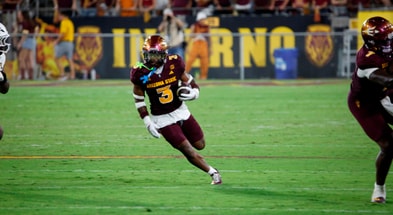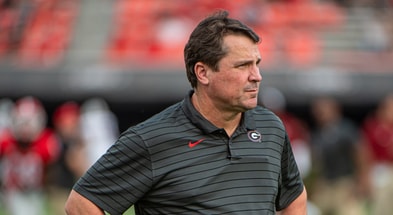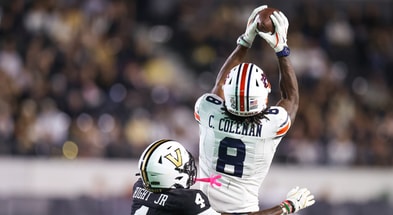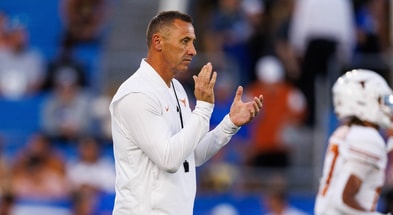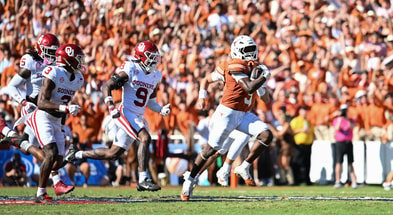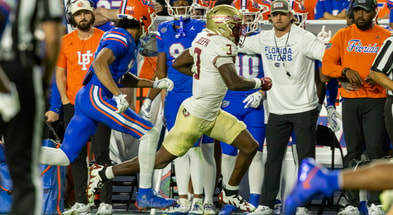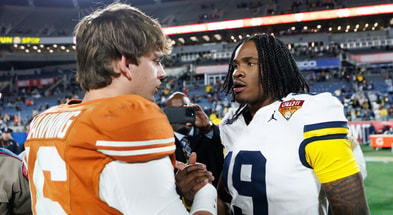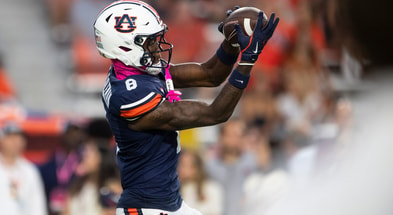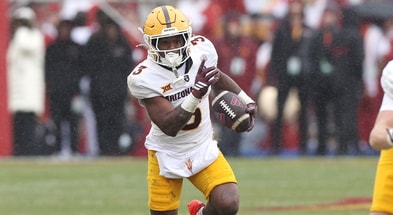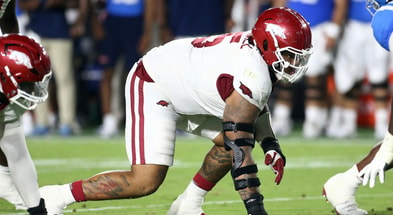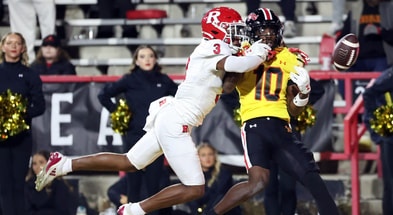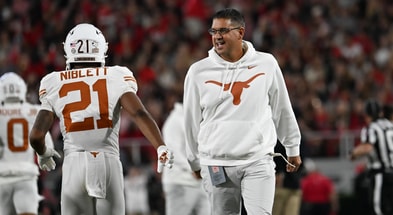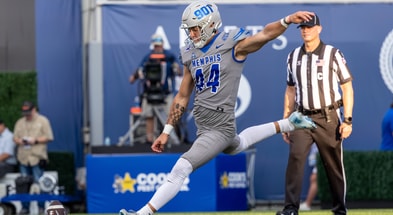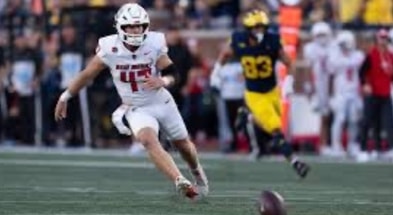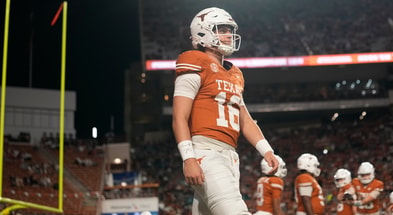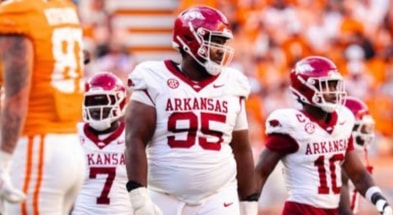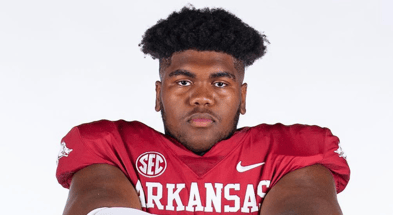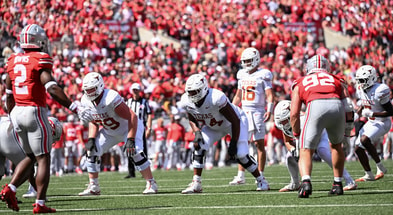Everything Kenny Dillingham said the day before the Peach Bowl
ATLANTA — Here’s everything Kenny Dillingham said on Tuesday ahead of Arizona State’s matchup with Texas in the Chick Fil-A Peach Bowl.
[Join Inside Texas TODAY and get 7 days for just ONE DOLLAR!]
KENNY DILLINGHAM: Once again I’d like to thank the Peach Bowl. Our guys are having the time of their life right now. Like I told them, enjoy the moments in between the work, and I think they’re doing that. They’re having a moment that they’ll remember for the rest of their lives, which was the purpose of these bowl games were to make memories that people carry on forever, and I think our team is doing that leading up to the game.
In terms of the game, our guys are putting in work. That’s what they know. We’re going to face one of the best teams in the country, if not the best team in the country, coached by arguably the best offensive coach in the country sitting next to me. And it’s a really tall task for our guys, but at the same token, if you’re a competitor, you want to compete versus the very best in the best environments, and I think that’s exactly what we get to do here tomorrow is compete versus the very best in the Peach Bowl, which is one of the best environments. So we’re excited as a football team. We’re excited as a football program.
Q. I know that coaches tend to be part of a small fraternity. Do you guys know each other, have history beyond this game? Do you guys remember meeting each other and have you kind of kept your eyes on each other throughout your various trajectories?
KENNY DILLINGHAM: Yeah. Same thing. We haven’t spent a lot of time together, but I’ve been watching what he’s done from afar. He was one of the first guys to do FIB, formation of the boundary, and really build plans around it and build systems around it.
So he’s always been kind of ahead of the curve offensively, and it’s somebody — if you’re an offensive guy and want to watch, you definitely want to watch what he’s doing because you know he’s also studying. He’s not a guy who’s going to be stagnant. So when you’re watching him, if you’re a year behind him, you’re about three years ahead of everybody else. So definitely a guy you want to watch offensively.
Q. Question for both of you coaches. You guys do have something in common, which is you didn’t have the results you wanted in year one, but yet you guys still trust the process that you would eventually have the success. Can you just talk about getting past year one, trusting the process when you don’t see the results and that basically that journey to where you are now?
KENNY DILLINGHAM: I’d say you have to have a belief in what you’re doing. And I know Coach Sarkisian and myself have been blessed to be around really good people. And you’ve seen a process that’s been successful. You’ve seen what it looks like, and you’ve gotta have a belief that if you stay the course, eventually it’ll turn.
And I know for me that was always, and for us as a program, that was always — the vision and the plan was, you know, it may not look good now, but if you stay the course and you stay the course and you stay true to the principles that you believe in and what a successful program looks like, eventually you’ll turn the corner.
And I think that’s where we’re at is we’re still trying to get better every single day, but at the same time, I think us staying the course has definitely helped us get to where we are right now.
Q. We are currently now in an era of college football where bowl games — you need to win multiple bowl games in order to win a National Championship, and decades past a bowl game was used just as a celebration, just as a way to celebrate a season, celebrate a single season with a single team.
What does it necessarily mean for you guys now to address your team in today’s college football of how to celebrate a season in a bowl game now knowing that you’ll have to play in multiple in order to win a National Championship?
KENNY DILLINGHAM: Yeah, I would agree with a lot of that. I mean, for us we gotta enjoy the moments throughout the process. You gotta take it all in, but you also gotta be able to get rid of those moments. So we gotta enjoy the moment of being at the Peach Bowl and being welcomed and the guys enjoying the event they put on last night for us and then get back to work. We gotta enjoy the game.
And if you win, you know, enjoy it. Then you gotta get back to work. But I think that’s no different than a normal regular season when you’re playing really good teams. Now you’re just doing it in bigger stakes, you’re doing it at a playoff. But you still have to appreciate the fact that you’re playing in one of the most iconic games in the history of college football, and you gotta appreciate that and take that for what it’s worth. You’ve gotta enjoy that moment and be able to move on from that moment when that moment ends and restart yourself.
Q. You guys both had an all-conference tight end on your roster this year. How important is that position, those guys, to what you want to do on offense?
KENNY DILLINGHAM: Yeah. I think if you actually statistically there is a couple GMs that I knew in the league asking them what was one of the greatest correlators to actually success, and it goes quarterback. And ironically there was a period of time where it was tight end. And that was the second greatest, in some systems, right, systems that we’re similar to, that was the next biggest piece to having a successful offense in terms of most value.
And I know there’s a period of time where the tight ends were devalued, but I actually think if you’re a run play action football team very similar to both of us, those guys have to control the middle of the field, not just in the vertical passing game, the intermediate passing game, but also the screen game.
And if you have a guy who’s dynamic with the ball who can block the C gap and also control in between the hashes consistently, vertically, immediately and at the line of scrimmage in the screen game, that is a weapon. And for us I think both of our systems really play into that position and play into somebody who’s not just good blocking, not just good down the field, but good with the ball in his hands.
Q. Coach Dillingham, I wanted to get your thoughts on the progress, the development of Sam Leavitt starting from the time he arrived on campus. What were your expectations for him and how has he obviously progressed to what you’ve hoped he would become?
KENNY DILLINGHAM: Yeah. Obviously he’s a really good athlete. So when you get really good athletes when they are young, they want to scramble. They want to make every play with their legs. I think one of his, not just the mental side of understanding protections, you don’t just have to run away from the guy that makes you hot and make him miss like you do in high school, right, because you’re a better athlete than most people. He’s started to understand protections. He’s started to understand hots and to use his athleticism when it is needed and not when he wants to.
And I think throughout the season, he’s really gotten better as when to use his athleticism, when to be ultra-aggressive, when to not, when to change pros, which is part of being a freshman is to help protect yourself. And has he exceeded my expectation? Yeah. I would say he has. And if I said he didn’t, I’d be lying to you.
He’s done such a great job as a freshman to come in. And what people don’t see is how hard he works behind the scenes. In any great quarterback is a great worker, and he’s an unbelievable worker. He’s an unbelievable person. He’s super intelligent. He’s super competitive.
He was in the game room the other day. We had the event that started at 7:00. He was playing somebody at ping pong. Then he started shooting hoops. I left and came back at 9:50, and I’m walking in with my wife. And I said, watch, I guarantee you Sam is one of the people left in here doing something competitive, and she was like no way. He was over there still shooting hoops. And that’s what has got him to this point is he’s wired in a way that he just wants to be the best all the time, all the time. And he has confidence in him wanting to be the best all the time.
Q. For both coaches, if you could just give us maybe your best example of your quarterback’s leadership this season and how they’ve evolved as leaders?
KENNY DILLINGHAM: I would say for us it was the Kansas game. We scored. We went down. Kansas came back and scored on a big play. And we still are feeling ourselves in terms of where are we as a program, can we win close games, can we not. And usually that’s the biggest hurdle.
When you take over a program is how do you win games late. How do you win close games. And part of that is players that thrive in those moments. And our quarterback went up to our guys with a smile on his face, and he just said you guys ready to go score, just like that. And that was the moment where everybody I think on our offense was looking at each other like, okay, we believe we’re going to win, but when that guy comes over that calm as a freshman, they were all saying what is he going to be like in this moment, when he comes over and he kind of cracks like a subtle confident joke of are you guys ready to go score, that was the moment and then we led our team down through a touchdown pass to Jordyn Tyson. He led them down. That was the moment where we’re like, okay, he plays his best in these biggest moments. He loves the attention on him in these moments. And those are what the best quarterbacks do, they thrive in those moments. That’s when I really felt like his leadership took a next step and the team bought into him.
Q. Kenny, could you tell me looking at your players this week, listening to them, they seem awfully confident and loose going into this game and I’m wondering if that’s exactly how you would want them to act?
KENNY DILLINGHAM: I think our players are just being themselves. And I think a lot of times there’s a lot of how are you supposed to talk to the media, what are you supposed to say, and I just firmly believe in say what you believe. And I’m not going to try to prevent our players from saying what they believe.
And if our players believe they’re the best, there’s probably a reason why Skatt had zero offers and went to Sac State when nobody believed in him and then came to Arizona State with not much competition for him. And nobody thought he was on NFL draft board going into the year.
If he didn’t have that own self-belief in himself that he believes he’s the best, then who else would have his entire life. So when he makes comments like that when people ask him a question and he gives you the truth of what he believes because his belief is what got him here and then people twist it on him as if he’s being cocky or confident, that’s not the nature of what he’s trying to say.
What he’s trying to say is my entire life I was the only one who believed in me. I’m not changing that. So now if you ask me the question and I give you a real answer, it kind of gets twisted into this cockiness or confidence when the reality is without him believing that his entire life, he wouldn’t be in the position he is.
And I would say that with him and Sam, who was not heavily recruited, three-star recruit out of high school, pretty under-recruited for where he was, didn’t play last year, same kind of thing for him too is those guys have a lot of self-belief because there was a point with the chip of their shoulder that they were one of the only people that believed in themselves.
And then when they get put in a situation and they’re asked a question and they say the truth of what they believe, if you’re a competitor and you don’t believe you’re the best, are you really a competitor. Like that’s what you want to do.
So I think just the honesty sometimes in today’s media is fun for people because they can take it and run with it. And that’s what they should do. Everybody should take those comments and run with it because that’s what’s fun. That’s what sells. But those are just two really, really competitive people. It’s nothing about the opponent. It’s about their own self-belief.
I mean, Sam probably thinks he could beat Michael Jordan in basketball. I mean, that’s Sam, right? Skatt thinks he’s probably the great running back of all time because that’s Skatt. And I think that’s what makes him unique. And sometimes when you verbalize those things, just what you internally believe, it gets twisted in a negative light. But I’m just happy that we have those guys on our team because they’re ultra competitors, and I have their back.
MODERATOR: Jordan now or Jordan then?
DILLINGHAM: Jordan then probably. Sam is pretty confident. But like I said, if you’re a competitor and you take the court or take the field in anything and you don’t want to be the best or compete versus the best, then something’s wrong. I mean, that’s the definition of competition.
Top 10
- 1New
Kewan Lacy
Rebels RB decides on future
- 2Hot
Nebraska QB dominoes
Huskers line up multiple visits
- 3
Kenny Minchey
Flips transfer commitment
- 4Trending
Portal Predictions
Predicting transfer commitments
- 5
Bryce Underwood
Decides on Michigan future
Get the Daily On3 Newsletter in your inbox every morning
By clicking "Subscribe to Newsletter", I agree to On3's Privacy Notice, Terms, and use of my personal information described therein.
Q. Building off that, Kenny, is that the thing that’s enabled this team to accomplish what it has, and is there a boundary at which point a team can become overly cocky or too confident?
KENNY DILLINGHAM: Yeah, for us, I always talk about, you know, if you’re confident versus cocky, goes in your preparation. If your confidence in yourself starts having you prepare less than you have prepared, well, be prepared to be humbled, because now you’re letting it affect you.
If you go about your business and everybody should have a self-belief, whether you verbalize it to the media or not, everybody going into this game on both teams should feel like they’re the very best. And if you don’t, if you don’t believe that you can win the football game, I mean, we’re 14-point dogs. We’re facing a team that was picked to win the National Championship preseason by a lot of people. And if you don’t have that belief that you can win the football game, if you don’t go that you believe you can match up, then you have no chance.
So like I said, I think sometimes in today’s nature when we put a microphone in front of kids, they say what they’re believing and that gets pushed in a negative light. When in reality, they’re just saying what everybody would be thinking if they were in their shoes. Maybe they just said it out loud, and people aren’t supposed to say the actual response to the question.
People want us to respond to the questions in the perfect answer that is supposed to be responded to, not the actual truth nowadays. And I think sometimes the 18 to 23-year-olds just say what they believe, and that sometimes gets twisted.
Both those kids are incredible kids. I do believe that’s a reason where we’re at is that we have a lot of guys with a chip on their shoulder who were counted out, were underdogs, and we’re still underdogs, we’re still counted out, but that shouldn’t change your own self-belief in yourself.
Q. Coach Kenny, Jake Plummer named an honorary captain for the game. What has his presence meant for the team throughout the entire course of this season and what does it mean to have him back here this weekend as kind of a full-circle moment for the program?
KENNY DILLINGHAM: Yeah, it’s awesome for the program. Coach Sark and I were talking about it. They were in the same class, I just learned, coming out, and we were talking about how the last time Arizona State played in a game of this magnitude was Jake Plummer was under center, literally under center back then.
And he was under center, and it was — I mean, he’s what Arizona State, him Pat Tillman, that era before, are the last time that we’ve reached these heights, and having him back involved, having him around, having him want to be around and that era of people want to be around, hopefully it’s infectious and hopefully it continues on the next few years, the next few decades, and we can kind of put a string of years and seasons and decades together of really good, competitive ASU football.
Q. For both coaches, you have been on either side of having a bye week in the playoff, and kind of talk about the pros and cons of whether you’d rather keep the momentum and play a game in the middle or have that extra rest and time to prepare.
KENNY DILLINGHAM: Yeah, I have no clue. I haven’t been in both settings. So we’ll find out tomorrow at about 5:00 if I like the bye or not. But at the end of the day, we’re about to go play with eight teams left. If you can’t get excited to play, if there’s an excuse for why you didn’t play the level you played, something is wrong. At the end of the day, two really good football teams are going to go play each other regardless of the bye or not.
Q. This question is for both Sarkisian and Coach Dillingham. This week the National Football Foundation and the College Hall of Fame put out a list of those that they’re honoring for their role in college football and also for future generations, and you two are the future generation.
So I’m curious, is there anyone in your past that not only taught you about football, but about carrying this legacy forward and how do you have that conversation with your players?
KENNY DILLINGHAM: For me, obviously Mike Norvell is one of the guys in the profession that’s one of my mentors, and he’s just a guy that I kind of look up to from that perspective. Obviously he’s young as well. So I don’t know if that helps with the question, but ironically, I don’t know as many coaches or guys that have been super successful.
I haven’t been blessed to maybe be around some of the older guys who have done it. I’ve studied from afar. I don’t read books, but I listen to audio books. And I’ve listened to a lot of those guys’ books and trying to take in the Pete Carroll stuff and Bill Belichick stuff and as much stuff as I can acquire and learn.
So I don’t know if there’s a specific guy in that era that’s being inducted, but I do know there’s a lot of really successful people, and the one thing I have learned through all those people is they’ve all done it their own way, and there’s no cookie cutter way to do this. You gotta be genuine to yourself, and you gotta take things you learn and make it your own.
Q. Kenny, what’s a similarity and a difference between Frank Kush’s coaching style and your coaching style and how has that shaped your success this season?
KENNY DILLINGHAM: I wasn’t around really with Frank Kush. I’m a little younger than that. But I do remember just the demand he put on his players. I would say we may get a thing nowadays. He had so much success because the standard that he had, and I think that’s every good coach has a high standard.
I would say the difference is how you get to that standard nowadays is probably a little different than how you could get to that standard back then. But Frank Kush has built the foundation for Arizona State football and even to be mentioned in the same sentence with him is an honor.
Q. Kenny, your first year in the Big 12. I’m curious what you thought of that league from a competitive standpoint and do you think your team’s performance in the playoff could or should affect the Big 12’s perception of the playoff format moving forward?
KENNY DILLINGHAM: Yeah, for us obviously the Big 12, really competitive league, really fun environments to be in. It was fun to travel to some of those environments and play some really, really good football teams.
Obviously I couldn’t answer the second question. That’s way out of my scope. I’m not that smart. I just know how to run power right and counter left, which is what Gus Malzahn taught me years ago.
I’ll stick to the football. I’ll let all the politicians, and all those people stick to who gets in the playoffs and who’s not. If we win enough football games, we’ll be in. If we don’t win enough football games, we won’t.
And if you get blessed to play another football game, you pour everything you have into it. And if it’s the last one you play, then you should have won more games and repeat, so that’s how I look at it, but I’m not going to get into the details on that.
